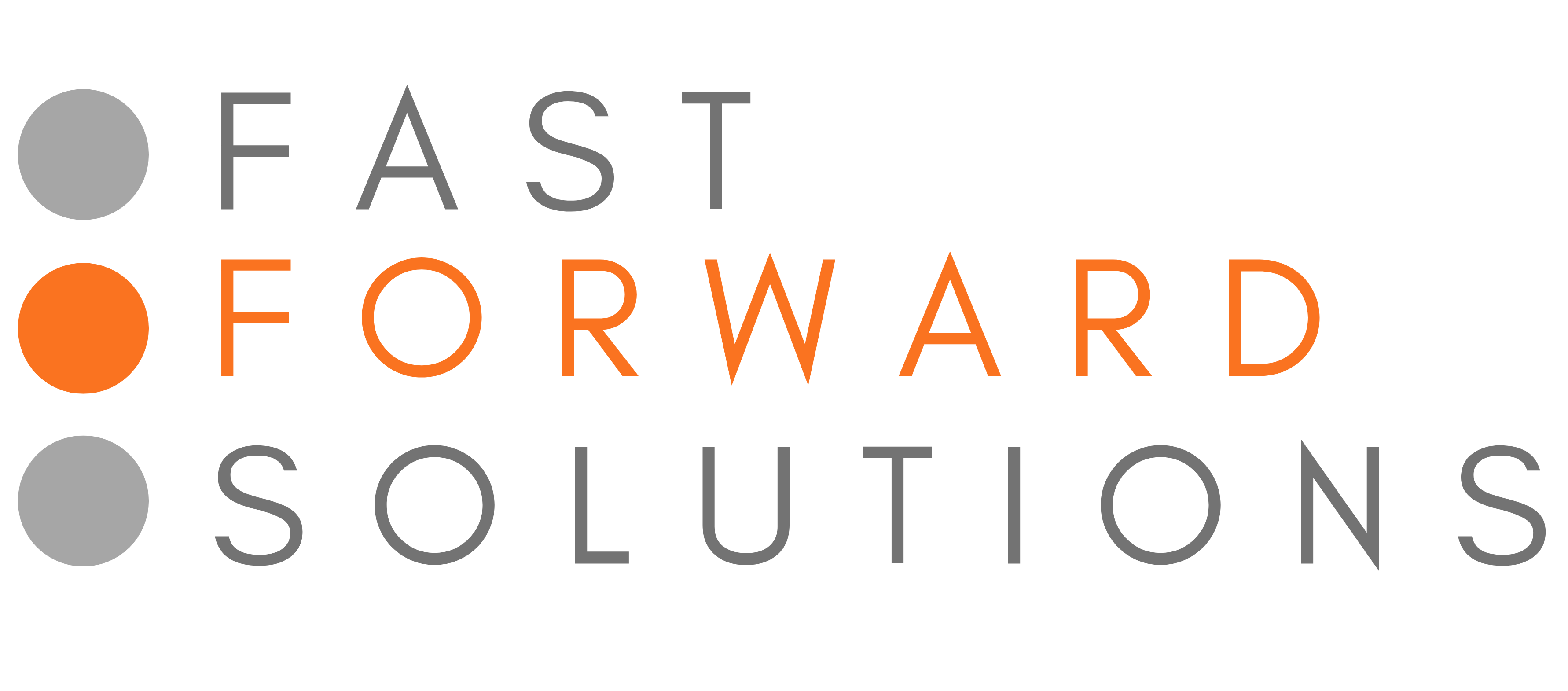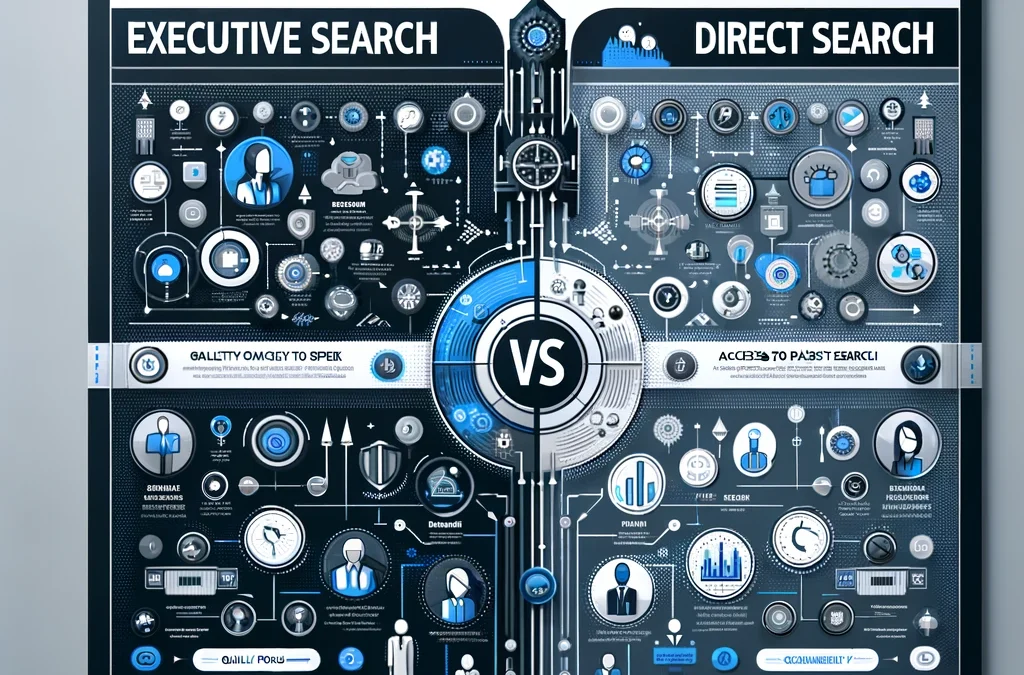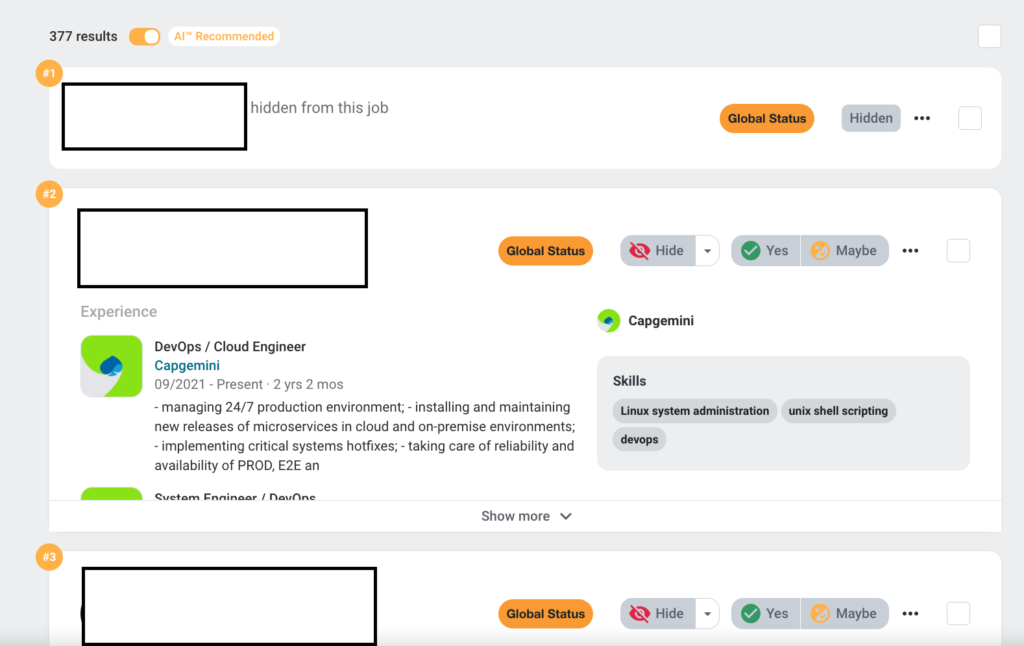
Executive Search w Polsce: Kiedy warto zainwestować w poszukiwanie liderów?
by Mati | kwi 18, 2024 | Dla Pracodawcy, Rekrutacja
Co to Executive Search i jakie przynosi korzyści?
Executive Search, znane również jako “wyszukiwanie kadry wykonawczej”, to wyspecjalizowany proces rekrutacyjny skierowany do wyszukiwania i pozyskiwania kandydatów na najwyższe stanowiska w organizacji. Proces ten jest znacznie bardziej złożony i zaawansowany niż tradycyjne metody rekrutacji, ponieważ wymaga nie tylko identyfikacji, ale również zaangażowania i przekonania wysoce kwalifikowanych liderów do przejęcia kluczowych ról w firmie.
W odróżnieniu od standardowych procesów rekrutacyjnych, Executive Search koncentruje się na kandydatach, którzy niekoniecznie aktywnie szukają pracy, lecz ich umiejętności, doświadczenie i potencjał lidera są idealnie dopasowane do specyficznych potrzeb firmy zlecającej. Dzięki temu firmy mogą zapewnić sobie dostęp do najlepszych talentów na rynku, co jest szczególnie ważne w przypadku pozycji, które mają kluczowe znaczenie dla strategii i sukcesu przedsiębiorstwa.
Dlaczego warto zainwestować w Executive Search?
- Dostęp do pasywnych kandydatów: Wiele wybitnych talentów nie szuka aktywnie pracy, ale może być otwarte na nowe możliwości. Executive Search otwiera drzwi do tej ekskluzywnej grupy.
- Specjalistyczne doświadczenie: Agencje Executive Search posiadają specjalistyczną wiedzę i doświadczenie w poszukiwaniu, ocenie i przyciąganiu liderów, co zwiększa szanse na znalezienie idealnego kandydata.
- Oszczędność czasu i zasobów: Proces wyszukiwania wysokiej klasy menedżerów jest czasochłonny. Zlecając go specjalistom, firma może skupić się na swoich podstawowych działaniach.
- Poufność: W wielu przypadkach poszukiwania na wysokim szczeblu wymagają dyskrecji, na przykład gdy firma poszukuje zastępstwa dla obecnie zatrudnionego lidera. Executive Search zapewnia ten poziom poufności.
Korzystanie z usług Executive Search jest szczególnie wartościwe, gdy firma poszukuje lidera zdolnego do prowadzenia przez zmiany, wprowadzenia innowacji lub zintensyfikowania wzrostu. Jest to inwestycja w przyszłość firmy, która może przynieść znaczne zwroty przez lata.
Kluczowe zalety Executive Search dla Twojej firmy
Wybór właściwej kadry zarządzającej ma fundamentalne znaczenie dla sukcesu każdej organizacji. Executive Search oferuje unikalne korzyści, które mogą znacząco wpłynąć na efektywność i przyszłość firmy. Oto niektóre z kluczowych zalet, które przynoszą usługi Executive Search:
Skoncentrowanie na jakości, a nie ilości
Executive Search nie koncentruje się na zgromadzeniu jak największej liczby kandydatów, ale na znalezieniu tej jednej, idealnej osoby, która najlepiej wpisze się w kulturę organizacyjną firmy i będzie miała kompetencje niezbędne do osiągnięcia celów biznesowych. Proces ten jest głęboko personalizowany i skupiony na jakości.
Globalny zasięg poszukiwań
Dzięki globalnej sieci kontaktów, agencje Executive Search mają możliwość poszukiwania kandydatów na całym świecie. To otwiera dostęp do międzynarodowej puli talentów, co jest szczególnie ważne w przypadku specjalistycznych lub wysoko niszowych ról.
Oszczędność czasu i zasobów
Poszukiwanie kandydatów na wysokie stanowiska jest procesem czasochłonnym i wymagającym. Outsourcing tej funkcji do agencji Executive Search pozwala liderom organizacji skoncentrować się na bieżącej działalności, jednocześnie mając pewność, że proces rekrutacyjny jest prowadzony efektywnie i profesjonalnie.
Poufność i dyskrecja
W przypadkach, gdy rekrutacja na wysokie stanowisko musi pozostać poufna (na przykład przy zastępowaniu obecnego pracownika), Executive Search oferuje dyskrecję, która jest trudna do osiągnięcia przy wewnętrznych procesach rekrutacyjnych.
Inwestycja w usługi Executive Search to strategiczne podejście do budowania silnego zespołu kierowniczego, które może znacząco wpłynąć na długoterminowy sukces firmy.
Jak Executive Search wpływa na innowacje i wzrost firmy?
W dynamicznie zmieniającym się świecie biznesu, innowacje i zdolność do szybkiego dostosowywania się do nowych warunków rynkowych są kluczowe dla przetrwania i rozwoju każdej firmy. Proces Executive Search odgrywa tutaj niebagatelną rolę, pomagając organizacjom nie tylko wypełnić wakaty na wysokich stanowiskach, ale także znacząco wpłynąć na ich zdolność do innowacji i wzrostu.
Przyciąganie liderów myślących przyszłościowo
Executive Search pozwala na zidentyfikowanie i przyciągnięcie liderów, którzy nie tylko mają udokumentowane sukcesy na swoim koncie, ale także potrafią myśleć przyszłościowo i wprowadzać innowacje. Takie osoby są w stanie nie tylko dostosować firmę do bieżących trendów, ale również przewidywać przyszłe zmiany na rynku i odpowiednio na nie reagować, co jest kluczowe dla długoterminowego wzrostu.
Wzmacnianie kultury innowacji
Liderzy pozyskani przez Executive Search często wnoszą ze sobą nową energię, świeże perspektywy oraz innowacyjne podejścia do rozwiązywania problemów, co może znacząco wzmacniać kulturę innowacji w firmie. Ich doświadczenie w różnych branżach lub funkcjach może prowadzić do wprowadzenia nowych, efektywniejszych procesów, produktów lub usług.
Promowanie wzrostu poprzez strategiczne partnerstwa
Wybitni liderzy często mają rozbudowaną sieć kontaktów biznesowych i są w stanie wykorzystać te zasoby do nawiązywania strategicznych partnerstw, co może otworzyć firmie drogę do nowych rynków, technologii czy zasobów. Takie partnerstwa mogą być kluczem do szybszego wzrostu i ekspansji.
Zwiększanie konkurencyjności firmy
Przyciągając najlepszych liderów, firma może znacząco zwiększyć swoją konkurencyjność na rynku. Skuteczni liderzy potrafią lepiej zrozumieć potrzeby klientów, szybciej wprowadzać innowacyjne produkty lub usługi i efektywniej zarządzać zasobami firmy, co w efekcie przekłada się na lepsze wyniki finansowe.
Adaptacja do zmieniających się warunków rynkowych
Liderzy z doświadczeniem w prowadzeniu firm przez okresy zmian są nieocenieni w czasach niepewności. Ich umiejętność adaptacji do nowych warunków, zarządzania kryzysowego i przewodzenia zespołom przez trudne okresy może być decydująca dla przetrwania i rozwoju firmy.
Executive Search, poprzez przyciąganie liderów, którzy są w stanie wprowadzać innowacje, nawiązywać strategiczne partnerstwa, zwiększać konkurencyjność i adaptować firmę do zmieniających się warunków, stanowi kluczowy element strategii wzrostu dla przedsiębiorstw na każdym etapie ich rozwoju.
Summary
Wybór firmy Executive Search jest decyzją, która może zasadniczo wpłynąć na przyszłość Twojej organizacji. W tym kontekście, istotne jest, aby podejście do tego wyboru było przemyślane i oparte na dokładnej analizie potencjalnych partnerów.
Znalezienie firmy, która specjalizuje się w Twojej branży lub posiada bogate doświadczenie w rekrutacji na kluczowe stanowiska, jest pierwszym krokiem ku sukcesowi. Specjalizacja taka zapewnia, że firma posiada nie tylko wiedzę o specyficznych wyzwaniach i potrzebach Twojej branży, ale także ma dostęp do sieci kwalifikowanych kandydatów, którzy mogą nie być dostępni na otwartym rynku.
Równie ważne jest zrozumienie metodologii pracy wybranej firmy Executive Search. Sprawdzenie, w jaki sposób przeprowadzany jest proces od identyfikacji kandydatów aż po ich zatrudnienie, jakie narzędzia i techniki są stosowane do oceny ich kompetencji i dopasowania do kultury organizacyjnej, pomoże Ci ocenić, czy podejście danej firmy jest zgodne z oczekiwaniami Twojej firmy.
Nie należy także pomijać weryfikacji referencji i sukcesów firmy. Historia sukcesów może być dobrym wskaźnikiem skuteczności i profesjonalizmu, a opinie poprzednich klientów dostarczą cennych informacji na temat ich doświadczeń współpracy z daną firmą.
W procesie wyboru istotna jest również jakość komunikacji i relacji. Wybierając firmę, która ceni otwartą komunikację i budowanie długoterminowych relacji, zwiększasz szanse na skuteczną współpracę. Ważne, abyś czuł, że Twoje potrzeby są rozumiane i że firma jest w pełni zaangażowana w znalezienie najlepszych kandydatów dla Twojej organizacji.
Podstawowym aspektem jest również zrozumienie kultury firmy i wartości, jakimi się kieruje. Firma Executive Search powinna dokładnie zrozumieć kulturę Twojej organizacji, aby móc znaleźć kandydatów, którzy będą z nią współgrać, co jest kluczowe dla długoterminowego sukcesu i integracji nowych liderów z zespołem.
Na koniec, niezwykle ważna jest transparentność i etyka działania firmy Executive Search. Proces rekrutacji powinien być prowadzony w sposób otwarty, uczciwy i zgodny z najwyższymi standardami etycznymi. Zapewni to nie tylko sukces procesu rekrutacyjnego, ale także ochronę reputacji Twojej firmy.
Podsumowując, wybór firmy Executive Search to kompleksowy proces, który wymaga rozważenia wielu czynników. Odpowiedni partner może znacząco przyczynić się do wzrostu i rozwoju Twojej organizacji, przyciągając liderów, którzy będą napędzać innowacje i wzrost.
Make an appointment for a free consultation
Take advantage of our free consultation and find out how we can help you with this challenge.
Schedule a 15-minute online meeting and start building your dream team with our help


















Latest comments